How Friendship Is Changing the Lives of Belize’s Elders
We all share the journey of growing older, but for many in Belize, that road can feel a little lonely. This week on The Bright Side, as we celebrate the International Day of Older Persons, we’re shining a light on something truly heartwarming, how our seniors are finding care, companionship, and dignity in their golden years. Some have the love and support of family, while others rely on caregivers who do so much more than help with daily tasks, they bring friendship, laughter, and a sense of belonging. Sabreena Daly sat down with one remarkable elder who’s found not just a helping hand, but a true friend in her weekly caregiver. And trust me, their story will make you smile. Here’s what she discovered.
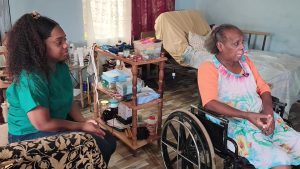 Sabreena Daly, Reporting
Sabreena Daly, Reporting
In a quiet home in Belize City, time moves a little slower for June Barber. Her children have grown up and built lives of their own, leaving her with quiet days filled mostly with the whispers of old memories. For many older people like her, the later years can bring more than wrinkles, they bring loneliness, and the daily struggle to care for themselves. But even in this stage of life, dignity still matters.
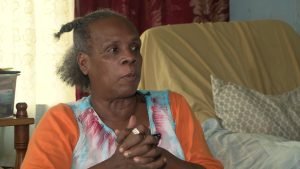
June Barber
June Barber, Elder
“Everybody has to get old. And eventually you don’t even know if something would happen to you. You need someone to help you.”
In Belize, fewer than one in ten people are over sixty, and for many, growing older means facing those years alone, without the support they need to age with dignity. But for Barber, her story is a little different; most recently, she has a weekly visitor to look forward to.
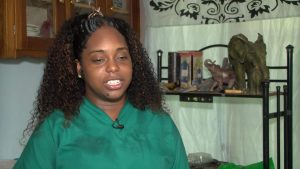
Nya Carter Pandy
Nya Carter Pandy, Caregiver
“ I see her three times for the week and why she is so special to me is because i feel like i get her in the way how we communicate, the way how we try build up bond to get things done. It’s very unique.”
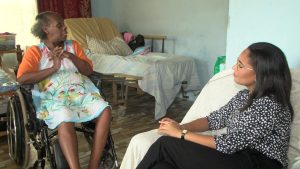 Nya Carter Pandy says caring for her patients goes beyond duty, it’s about building trust and sharing small moments that matter.
Nya Carter Pandy says caring for her patients goes beyond duty, it’s about building trust and sharing small moments that matter.
Nya Carter Pandy
“I have a lot of fun with my patients, especially Miss June. I love to hear her stories. Her stories are very interesting. So I always look forward to coming to Miss June.”
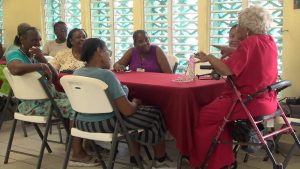 Well in her sixties, June Barber saw her fair share of challenges in life. From battling breast cancer two years ago, to losing her mobility after a recent stroke. Now, she just wants to know she’s not alone. That’s the heart of the Ministry of Human Development’s Elderly Homecare Program, an initiative that turns silence into something beautiful: care, connection, and dignity for our seniors.
Well in her sixties, June Barber saw her fair share of challenges in life. From battling breast cancer two years ago, to losing her mobility after a recent stroke. Now, she just wants to know she’s not alone. That’s the heart of the Ministry of Human Development’s Elderly Homecare Program, an initiative that turns silence into something beautiful: care, connection, and dignity for our seniors.
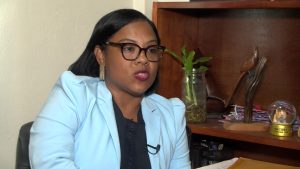
Tiffany Garbutt
Tiffany Garbutt, Human Dev. Coordinator, Family Support & Gender Affairs Dept.
“These caregivers go to these homes three times for the week, and they provide care in terms of companionship. They provide physical care for the older persons, clean their homes, comb their hair, bathe them, change who needs to be changed and provide socialization. If they need to go out to the market or if they have some errands, the caregivers will take them out as well. And so there’s a wide range of services within the in-home care giving program that we provide in partnership with some of the families for those who have families or alone for those who live alone.”
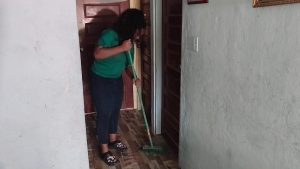 Behind every act of care is a story of purpose. Eight women completed a three-month training and now provide free care to over twenty seniors across the country. Through this work, they’re not only supporting elders but also experiencing their own form of empowerment, with social workers providing guidance, mentorship, and support to ensure quality care.
Behind every act of care is a story of purpose. Eight women completed a three-month training and now provide free care to over twenty seniors across the country. Through this work, they’re not only supporting elders but also experiencing their own form of empowerment, with social workers providing guidance, mentorship, and support to ensure quality care.
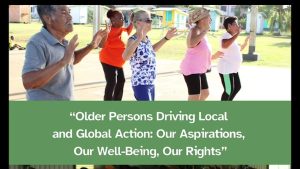 Tiffany Garbutt
Tiffany Garbutt
“The program started out with caregivers who were trained by the Ministry, in support with Red Cross as well. We have varying referral agencies in terms of caregivers. Some would come already trained by Red Cross or BTech, and then the Ministry started training our caregivers as well. We have qualified caregivers who go into the home with these older persons to ensure that they provide quality and optimum care for them.”
To understand why programs like these are so vital, we turn to the bigger picture. Ix-Chel Poot, Executive Director of the National Council on Aging, has been closely monitoring the challenges facing older persons in Belize. From the rising number of seniors living alone to the challenge of accessing basic resources, she explains why bringing dignity back to our later years is a national responsibility.
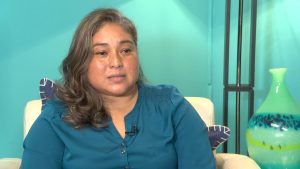
Ix-Chel Poot
Ix-Chel Poot, Executive Director, National Council on Aging
“When we look at Belize’s older population and we talk about aging with dignity, we’re really talking about a society where older persons are respected, other persons can access services, other persons can move around the community, but more so other persons are not invisible. When someone can come in and spend a few minutes with you in the day getting you back on track. You know, today is Wednesday. These are the things that are happening in Belize that go for mental health. So these kinds of things add value to the life of the older person as we age throughout the life cycle.”
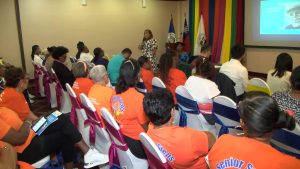 When we think of the cycle of life, it’s easy to focus on beginnings and endings. But beauty lies in how we care for each other in between.
When we think of the cycle of life, it’s easy to focus on beginnings and endings. But beauty lies in how we care for each other in between.
June Barber
“I would like for people to understand one another and talk to one another. If you have older people with you, take care of them because they will be old one of these days as well.”
This work reminds us that compassion and connection don’t have an age limit, and that dignity, respect, and love are things we all deserve at every stage of our lives. Looking on the Bright Side, I’m Sabreena Daly.






Facebook Comments